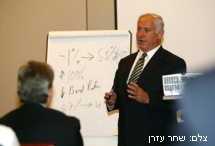The Minister of Finance, Mr. Benjamin Netanyahu, today informed Mr. Ehud Olmert- the Vice Premier, Minister of Industry, Trade, and Employment, and Minister of Communications-that he will be joining the trip to India in accordance with a previous agreement about a joint visit by the ministers of Finance and of Industry, Trade, and Employment.
Mr. Olmert welcomed the Minister of Finance, Mr. Benjamin Netanyahu, to the mission and stated that both ministers will head this official mission to India in early December.
The ministers will be accompanied by a business delegation headed by Shraga Brosh, chair of the Israel Export and International Cooperation Institute, with the participation of some 100 companies in high-tech, communications, IT, software, medical equipment and biotechnology, infrastructure projects, environmental quality, agriculture and water, and security and guard services.
Ministers Olmert and Netanyahu regard the development of Israel–India trade relations as a matter of vast importance and consider India (along with China) one of the two large economies that have vast potential for an increase in economic activity with Israel.
Notably, trade relations between Israel and India have been expanding rapidly in recent years. India is one of Asia’s fastest developing economies and has become a focal point of interest in investments by American and European software, communications, and high-tech firms.
The two ministers also note that the Indian business community has been displaying more and more interest in Israeli industry, as reflected in a strong response to meetings with representatives of Israeli firms who visited India during the past year. The purpose of the current visit is to reinforce economic and trade relations and to improve the government infrastructure in regard to R&D cooperation and opening of doors for Israeli industry in communications and in agriculture and water projects.
The ministers’ itinerary includes visits to and business activity in Mumbai, India’s commercial center; Delhi, the political center and the city where leading telecom companies have established their headquarters; and Bangalor, considered the center of Indian high-tech and the seat of many multinational firms (such as Wipro, Infosys, and Tata Consultancy).
The mission is being organized by the Israel Export and International Cooperation Institute and will cooperate fully with all relevant professional entities and organizations: the Ministry of Industry, Trade, and Employment; the Ministry of Foreign Affairs, the Manufacturers’ Association of Israel, IFTRIC (the Israel Foreign Trade Risk Insurance Corporation), the Association of Electronics Industries, IVA (Israel Venture Association), SIBAT (the Foreign Defense Assistance and Defense Export Organization), MATIMOP (the Israeli Industry Center for R&D), and the Association of Contractors.
Shraga Brosh, who as chair of the Israel Export and International Cooperation Institute and head of the business delegation, notes that Israeli firms may take part in readily available projects in India and may offer relevant systems. They may also be compatible with India’s computer and software industry, which is developing rapidly with the assistance of a national task force established by the Government of India.
Telecommunications is another industry that has been undergoing a dynamic rebirth in India. A liberal government policy has been encouraging the private sector to get involved.
India encourages investments in infrastructure and road services, including some that use the B.O.T. method, and is allowing investors to charge toll for the use of roads.
NHAI, the government authority that deals with these projects, is giving grants at 40 percent of investment as well as tax benefits.
The Government has also decided to take measures to encourage the food and agriculture industries.
Shraga Brosh adds that India is considered one of the world’s most promising markets for industrial goods, especially those for private consumption. India is one of the world’s six largest consumers of energy and is continuing to grow rapidly. The government encourages investments in this field. Additionally, demand for security and guard services has been burgeoning in recent years.
Brosh reports that the Vice Premier and Minister of Industry, Trade, and Employment, and the Minister of Finance have recently been presented with a $1.2 million program for the development of markets in India. The Government has been asked to contribute $0.5 billion to the program; the remainder will be financed by the exporters.
Israel–India trade statistics:
Israel–India trade totaled $1.6 one billion in the first nine months of 2004. Exports were $759 million during this time as against $495 million during the year-earlier period, an increase of 53 percent. Most exports were in diamonds and gems (69 percent), machinery and instruments (17 percent), and chemical products (10 percent). The share of diamonds in exports has been falling conspicuously and that of high-tech products has been rising. Imports from India were $853 million in the first nine months of 2004 as against $670 million during the year-earlier period, a 26 percent increase.
The Foreign Trade Administration believes that total civilian bilateral trade will culminate at $2 billion at the end of 2004. The Indian market is growing rapidly, amidst rising standards of living and a growing share of disposable income among the middle class.
Olmert and Netanyahu to Head Official Mission to India in Early December 2004
Deputy prime minister Mr. Ehud Olmert Minister of Industry, Trade, and Employment and Finance Minister Mr. Benjamin Netanyahu will head an official delegation to India which will visit the country during December.
29.11.04 / 00:00
•
More articles that may interest you
More news from Industry & Trade Section
>Report: 4 years Intifada cost Israel $12b/22.11.04
>Kazakhstan wants to increase bilateral trade/22.11.04
>"The Economist": growth rate for Israel in 2004 - 3.3%/22.11.04
>2004 - Communications equipment exports to rise 16.4%/15.11.04
>2003 - Israel had 383,000 businesses/15.11.04
>Israel-Asia trade to grow 30% this year to $14b/15.11.04
>October - Trade deficit soars to $1.3b/15.11.04
>European commission approved Israeli proposal for exports from territories/15.11.04
>Chambers of Commerce demand reform of food levies/08.11.04
>Export institute : Exports to EEC to grow 15% in 2004/08.11.04





